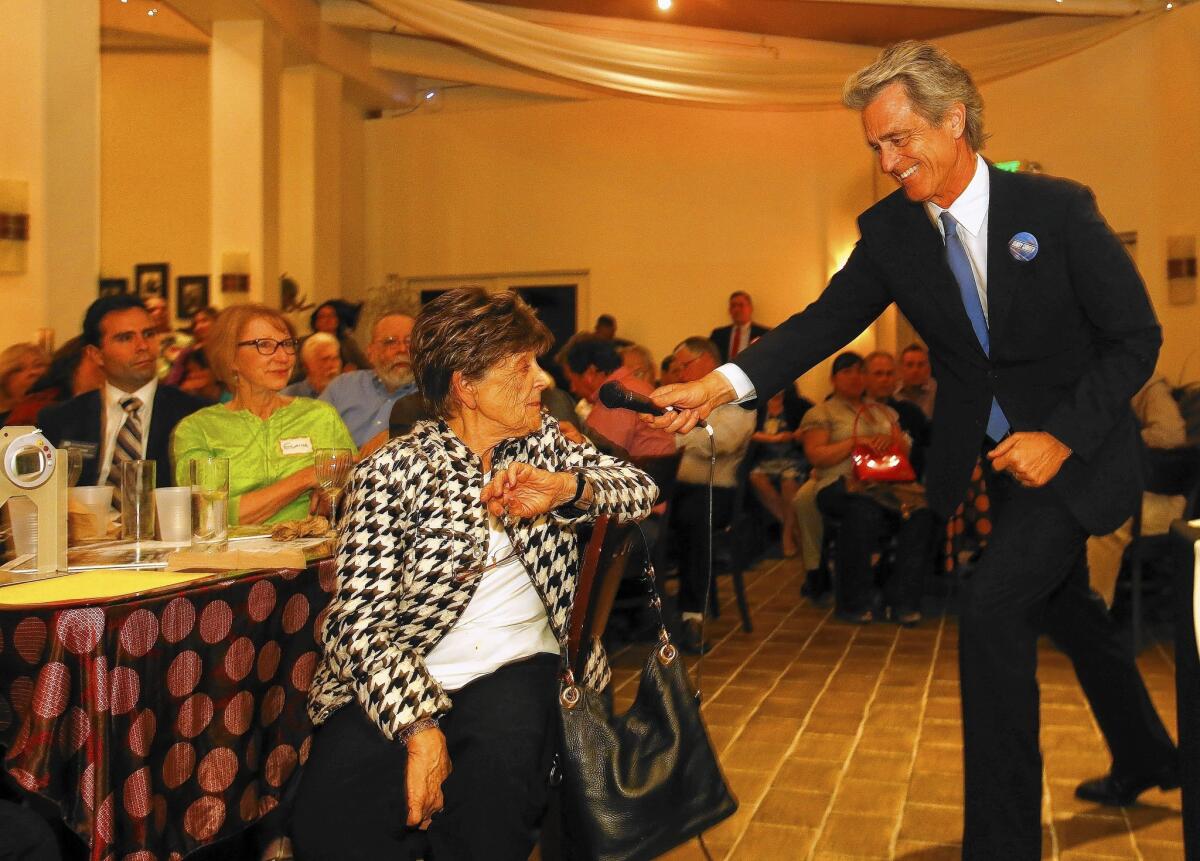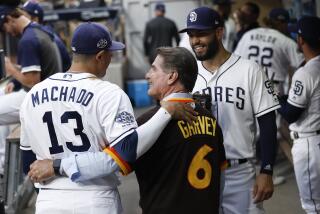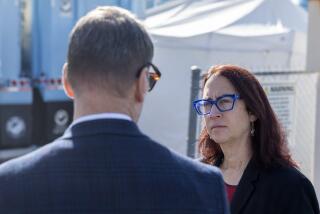Bobby Shriver’s ties that bind

Kennedy memorabilia is scattered around Bobby Shriver’s campaign headquarters. On one wall hangs a photo of a giant Robert F. Kennedy mural, on another the signed text of Sen. Edward M. Kennedy’s 1980 speech to the Democratic National Convention: “To Bobby. Christmas. Love, Uncle Ted.”
But the former Santa Monica mayor is tired of news stories tagging him as the nephew of President John F. Kennedy. He’d rather be known for getting AIDS medicine to Africa, or producing Christmas albums to raise money for the Special Olympics. Recapping his career highlights in an interview, Shriver leaned forward and raised his voice.
“So that’s not ‘John F. Kennedy’s nephew,’ right?” he said.
It’s a paradox of Shriver’s campaign to replace Zev Yaroslavsky on the L.A. County Board of Supervisors: His pedigree is a major asset, yet his main challenge in the June primary is to show that he’s more than just another Kennedy scion.
As Shriver tries to build support among the Westside and San Fernando Valley voters who control his political fate, there’s no escaping how profoundly his family’s legacy has shaped his life and career. A grandson of family patriarch Joseph P. Kennedy, Shriver, 59, is the oldest son of Eunice Kennedy Shriver and Sargent Shriver.
If he wins, he will join the five-member board that runs L.A. County’s sprawling government of more than 100,000 employees.
Shriver’s personal fortune — he has disclosed more than $12 million in assets — sets him far apart from many of those who rely on county services: the poor and uninsured, the homeless, the mentally ill, and abused and neglected children. But, he said, those are the people who inspired him to join the campaign. “I had other choices, and I chose this one, and I chose it because I got fired up,” he said.
His chief opponent, former state Sen. Sheila Kuehl, has cast Shriver as a dilettante. Her chief strategist, Parke Skelton, pointed out that what led Shriver to run for the Santa Monica City Council in 2004 was his annoyance with inspectors who ordered him to trim the hedges of his hillside house above Will Rogers State Beach. It’s telling, he said, that Shriver missed nearly one in five council meetings during his eight years in office. “He was a fairly lackadaisical City Council member,” Skelton said.
Shriver called the attack a “smear.” “I’ve got a record of doing stuff that no dilettante could do,” he said.
Seen by some as charming, by others as pushy, Shriver is prone to bursts of profanity in conversation. He revels in his stories, some featuring famous friends. (He and his wife, Malissa Feruzzi, reported wedding gifts from the likes of Eric Clapton, David Geffen and Renée Zellweger.)
His laugh is big and loud. For comic effect, he punctuates remarks with a bang on a table.
On a drive to a campaign stop in Chatsworth, Shriver was talking about how to find money for new L.A. train lines when he shifted suddenly to a joke about France’s “wealth tax.” “They come into your house, count up the TVs and tax you on the number of TVs,” he said. “Do I support that? Yes. But only in Santa Monica. Only north of Montana.”
Yaroslavsky, who is neutral in the race, described Shriver as “a dynamic, energetic, almost frenetic kind of guy.” “When he gets on an issue, he doesn’t let go,” he said.
Shriver acknowledged he’s sometimes gone too far. His plan to increase veterans housing in Los Angeles, he said, initially left people “thinking that I was an arrogant twit” who wanted to “tell everybody what to do.” “What I learned from that is that it’s very important to put the idea out there in a respectful way prior to announcing it,” he said.
Shriver’s upbringing in the 1960s put him near the center of historic events. When his uncle was elected president, Shriver was a first-grader in Chicago, where his father managed the Kennedys’ Merchandise Mart.
President Kennedy put Sargent Shriver in charge of the new Peace Corps. The Shrivers moved to a 200-acre farm outside Washington, with cattle, pigs, chickens and Bobby’s pet monkey, which his father had brought home from Africa. “The name of the monkey was LBJ,” Shriver recalled. “And Lyndon Johnson himself met the monkey.”
Shriver’s mother, troubled that her mentally disabled sister Rosemary had been treated as an outcast, started a camp at the farm. About 100 mentally disabled high school students spent summer days there in what was a precursor to the Special Olympics that Eunice Kennedy Shriver would later establish.
After John Kennedy’s assassination, President Johnson chose Sargent Shriver to lead his War on Poverty, then named him ambassador to France. Bobby was 14 when the family moved to Paris, where he roamed the city on a motor scooter and learned to speak French.
In June 1968, Shriver’s mother lost another brother when Sen. Robert F. Kennedy was assassinated. To Shriver, it was “the end of the world as we knew it.”
“Uncle Bobby was a guy we really knew,” Shriver said, recalling regular family football games.
Shriver’s personal initiation into public life came in 1970, when his Cape Cod marijuana arrest with cousin Robert F. Kennedy Jr. — both were 16 years old — made the New York Times front page. Shriver went on to get a bachelor’s degree at Yale, then worked as a reporter at the Chicago Daily News and L.A. Herald Examiner. He returned to Yale for law school, clerked for a California federal appellate judge, Stephen R. Reinhardt, then moved to New York for a job at the James D. Wolfensohn investment firm.
“I felt I needed to know the money world to do the kind of work I wanted to do,” Shriver said.
In 1987, Shriver co-produced the first in a series of “Very Special Christmas” albums. The compilations of pop stars singing holiday tunes have raised more than $100 million for Special Olympics groups worldwide. Shriver, whose 5-year-old daughter is named after his aunt Rosemary, has remained in charge of the operation.
One of the musicians he met on the first album was Bono, who recruited Shriver in the late 1990s to work on debt relief for the world’s poorest nations, mostly in Africa. The two became partners leading a global organization now known as One. It started with Shriver introducing Bono to Paul Volcker, David Rockefeller and other “custodians of economic life” in America, as Bono put it.
Shriver also served as navigator for the pair’s lobbying of the Clinton White House and Congress, culminating in $435 million in U.S. debt forgiveness in 2000. Shriver and Bono mounted a similar campaign to prod President George W. Bush’s administration to launch a $15-billion effort to fight AIDS overseas, mainly in Africa. They also started Red, a project that steers profits from the sale of consumer products to AIDS relief in Africa.
In an interview, Bono described Shriver as a pragmatist who was “maniacal about the detail of things and follow-through and strategy.”
“I guess this is from his family,” Bono said. “We got the advantage of all that history, and any mistakes that were made, and any victories that were before him — we got a distillation of that.”
In California, Shriver entered politics in 2001, when Gov. Gray Davis named him to the state Park and Recreation Commission, a post he used to fight a plan to build a toll road through San Onofre State Beach. As a part-time Santa Monica councilman, from 2004 to 2012, Shriver was most outspoken as an advocate for housing homeless veterans at the Veterans Administration campus in West L.A.
Toni Reinis, co-founder of the New Directions for Veterans nonprofit, said the federal government’s agreement to open at least one building to house disabled veterans was a “small step forward,” but applauded Shriver’s effort to push for the project.
In the supervisor’s race, Shriver’s wealth is keeping him competitive in spending, and his name is drawing news cameras. What’s uncertain is whether what he calls his “get-it-done” record will show voters, in Shriver’s words: “It’s not only John F. Kennedy’s nephew.”
More to Read
Sign up for Essential California
The most important California stories and recommendations in your inbox every morning.
You may occasionally receive promotional content from the Los Angeles Times.











